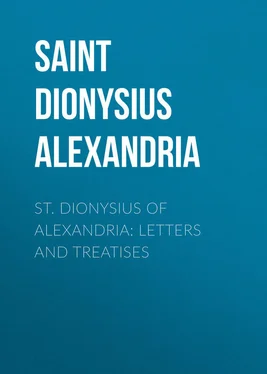Saint Dionysius of Alexandria - St. Dionysius of Alexandria - Letters and Treatises
Здесь есть возможность читать онлайн «Saint Dionysius of Alexandria - St. Dionysius of Alexandria - Letters and Treatises» — ознакомительный отрывок электронной книги совершенно бесплатно, а после прочтения отрывка купить полную версию. В некоторых случаях можно слушать аудио, скачать через торрент в формате fb2 и присутствует краткое содержание. Жанр: foreign_religion, foreign_antique, foreign_prose, на английском языке. Описание произведения, (предисловие) а так же отзывы посетителей доступны на портале библиотеки ЛибКат.
- Название:St. Dionysius of Alexandria: Letters and Treatises
- Автор:
- Жанр:
- Год:неизвестен
- ISBN:нет данных
- Рейтинг книги:5 / 5. Голосов: 1
-
Избранное:Добавить в избранное
- Отзывы:
-
Ваша оценка:
- 100
- 1
- 2
- 3
- 4
- 5
St. Dionysius of Alexandria: Letters and Treatises: краткое содержание, описание и аннотация
Предлагаем к чтению аннотацию, описание, краткое содержание или предисловие (зависит от того, что написал сам автор книги «St. Dionysius of Alexandria: Letters and Treatises»). Если вы не нашли необходимую информацию о книге — напишите в комментариях, мы постараемся отыскать её.
St. Dionysius of Alexandria: Letters and Treatises — читать онлайн ознакомительный отрывок
Ниже представлен текст книги, разбитый по страницам. Система сохранения места последней прочитанной страницы, позволяет с удобством читать онлайн бесплатно книгу «St. Dionysius of Alexandria: Letters and Treatises», без необходимости каждый раз заново искать на чём Вы остановились. Поставьте закладку, и сможете в любой момент перейти на страницу, на которой закончили чтение.
Интервал:
Закладка:
As Christian Philosopher
19. The long extracts which remain from his book On Nature (περὶ Φύσεως), directed against the Epicureans, show him to have possessed on the whole a clear grasp of their tenets, together with much genuine humour and entire absence of bitterness of spirit in criticizing them.
The extracts given by Eusebius appear to be fairly continuous throughout: they deal (1) with the atomistic portion of the Epicurean philosophy, and (2) with the more strictly “theological” portion of it, the references to the hedonistic doctrine being only slight and passing.
Dionysius begins by remarking that of the various hypotheses which have been started as to the origin of the universe, one of the least satisfactory is that of Epicurus, viz. that it is the result of a chance concourse of an infinite number of atoms, as they rush through space.
He then proceeds to show by a series of illustrations taken from human workmanship that mere chance could never produce the wonderful results that we see all around us. So, too, from the study of the heavens the same inference must be drawn.
His next point appears to be that the difference in durability, which Epicurus postulates for the various bodies produced by atoms, goes to upset his theory. If some products ( e. g. the gods) are eternal and some are short-lived, what determines the difference? Some of the senseless atoms themselves must be gifted with powers of directing, arranging and ruling. But if it is mere chance, then Epicurus asks us, who study the order and the phenomena of earth and heaven, to believe the impossible.
The same conclusion is arrived at by the study of man, whose mere body is a machine so marvellous that some have emerged from the study of it with a belief that Φύσις herself is a deity. The higher powers, too, of man, his mind and reason and skill, all point in the opposite direction to Epicurus’s solution of the problem. It cannot, surely, be the atoms rather than the Muses which are responsible for the arts and sciences.
The half-humorous allusion to these heaven-born personages of heathen mythology leads Dionysius to attack the Epicurean theory of the gods. According to Epicurus, the gods in no way concern themselves with mundane matters, but spend a serene existence without labour or exertion of any kind. But such an existence, says Dionysius, is so repugnant to the very idea and instinct of man that it must be absolutely false with regard to divine beings.
At this point occurs a short passage in which the inconsistency of Democritus, from whom Epicurus had confessedly borrowed his physics, mutatis mutandis , is criticized, though it has only a general bearing upon the line of argument. Democritus, he says, who professed that he would have given the world in exchange for the discovery of one good cause (αἰτιολογία), yet in putting forward his ideas of Chance as a cause could not have been more absurd: he sets up Τύχη as the sovereign cause of the Universe, and yet banishes her as a power from the life of men. The truth is that, while practical men and even philosophers find their highest pleasure in benefiting others, by this theory the gods are to be kept from any share in such pleasure.
One other inconsistency in the Epicurean writings Dionysius next deals with, and that is Epicurus’s own constant use of oaths and adjurations, in which the names of those very beings occur whose influence upon men’s affairs he so depreciates. This is, in Dionysius’s opinion, due to his fear of being put to death by the state for atheism, as Socrates had been: though he is probably doing Epicurus a wrong.
The extracts end with a repetition of the appeal to the wonders of the sky and of the earth as a conclusive contradiction of Epicurus’s views. 8 8 I was much assisted in drawing up this summary of περὶ Φύσεως and also in writing the notes upon the extracts from the text by Professor H. Jackson, of Cambridge fame.
A selection from these interesting portions of a not unimportant work for its time will be found on pp. 91 ff. Конец ознакомительного фрагмента. Текст предоставлен ООО «ЛитРес». Прочитайте эту книгу целиком, купив полную легальную версию на ЛитРес. Безопасно оплатить книгу можно банковской картой Visa, MasterCard, Maestro, со счета мобильного телефона, с платежного терминала, в салоне МТС или Связной, через PayPal, WebMoney, Яндекс.Деньги, QIWI Кошелек, бонусными картами или другим удобным Вам способом.
General Characteristics of his Writings
20. The letter to Basilides on several points of ecclesiastical order (the larger portion of which is given on pp. 76 ff. Конец ознакомительного фрагмента. Текст предоставлен ООО «ЛитРес». Прочитайте эту книгу целиком, купив полную легальную версию на ЛитРес. Безопасно оплатить книгу можно банковской картой Visa, MasterCard, Maestro, со счета мобильного телефона, с платежного терминала, в салоне МТС или Связной, через PayPal, WebMoney, Яндекс.Деньги, QIWI Кошелек, бонусными картами или другим удобным Вам способом.
) is a model of what such episcopal utterances should be: it definitely states which is the highest and best course, but leaves the decision to the individual conscience. But it is to the general correspondence ( pp. 35 ff. Конец ознакомительного фрагмента. Текст предоставлен ООО «ЛитРес». Прочитайте эту книгу целиком, купив полную легальную версию на ЛитРес. Безопасно оплатить книгу можно банковской картой Visa, MasterCard, Maestro, со счета мобильного телефона, с платежного терминала, в салоне МТС или Связной, через PayPal, WebMoney, Яндекс.Деньги, QIWI Кошелек, бонусными картами или другим удобным Вам способом.
) that the bulk of English readers will probably turn, and that deals with a large variety of subjects: in some cases theological matters like Novatianism and the baptism of heretics are discussed; in others there are descriptions of the martyrdoms of his time at Alexandria and his own personal experiences under persecution, all told with a vividness and a sobriety eminently characteristic of the man: others are addressed to persons or districts in his province, especially at Eastertide, treating of matters of local and temporary importance, while one or two incidents which he records are of much value as illustrating church customs and manners of the period ( e. g. the case of Sarapion on p. 42 Конец ознакомительного фрагмента. Текст предоставлен ООО «ЛитРес». Прочитайте эту книгу целиком, купив полную легальную версию на ЛитРес. Безопасно оплатить книгу можно банковской картой Visa, MasterCard, Maestro, со счета мобильного телефона, с платежного терминала, в салоне МТС или Связной, через PayPal, WebMoney, Яндекс.Деньги, QIWI Кошелек, бонусными картами или другим удобным Вам способом.
, prayers for the Emperors on p. 47 Конец ознакомительного фрагмента. Текст предоставлен ООО «ЛитРес». Прочитайте эту книгу целиком, купив полную легальную версию на ЛитРес. Безопасно оплатить книгу можно банковской картой Visa, MasterCard, Maestro, со счета мобильного телефона, с платежного терминала, в салоне МТС или Связной, через PayPal, WebMoney, Яндекс.Деньги, QIWI Кошелек, бонусными картами или другим удобным Вам способом.
, matters connected with the celebration of Holy Baptism and Holy Communion on p. 59 Конец ознакомительного фрагмента. Текст предоставлен ООО «ЛитРес». Прочитайте эту книгу целиком, купив полную легальную версию на ЛитРес. Безопасно оплатить книгу можно банковской картой Visa, MasterCard, Maestro, со счета мобильного телефона, с платежного терминала, в салоне МТС или Связной, через PayPal, WebMoney, Яндекс.Деньги, QIWI Кошелек, бонусными картами или другим удобным Вам способом.
).
Интервал:
Закладка:
Похожие книги на «St. Dionysius of Alexandria: Letters and Treatises»
Представляем Вашему вниманию похожие книги на «St. Dionysius of Alexandria: Letters and Treatises» списком для выбора. Мы отобрали схожую по названию и смыслу литературу в надежде предоставить читателям больше вариантов отыскать новые, интересные, ещё непрочитанные произведения.
Обсуждение, отзывы о книге «St. Dionysius of Alexandria: Letters and Treatises» и просто собственные мнения читателей. Оставьте ваши комментарии, напишите, что Вы думаете о произведении, его смысле или главных героях. Укажите что конкретно понравилось, а что нет, и почему Вы так считаете.












